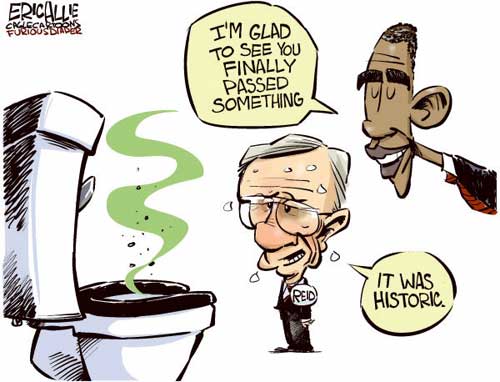 An editorial / By Dale McFeatters Scripps Howard News Service December 21, 2009
As much as a weary public might wish it would be, the debate is not over. Health-care was hardly "rushed" through Congress as the Republicans charge. This is just one act in an ongoing debate that goes back to the Truman administration.  By Eric Allie, Caglecartoons.com Distributed to subscribers for publication by Cagle Cartoons, Inc.
The more expansive $1 trillion House version includes a so-called "public option," a government-run insurance program to compete with private plans, and weaker restrictions on taxpayer funds going for abortions. The precarious Senate margin is hostage to lawmakers who say they will jump ship if the conference changes the bill substantially. If the conference produces a bill that becomes law, it is only the beginning of a long process to refine and fine-tune the health care system. There are too many unknowns. The two bills do not seriously attempt to control costs, and some of the financing mechanisms may be wishful thinking. The Congressional Budget Office says the $871 billion Senate bill will actually reduce the deficit $132 billion over 10 years, but that depends on Congress cutting $480 billion in Medicare payments over that time, cuts Congress may be unwilling to make when faced with them. And then there is the impact on the private insurance industry. One of the bills' most popular provisions with a public increasingly skeptical of the whole enterprise is a ban on insurance companies refusing to cover pre-existing conditions, first for children next year and then for adults in 2014. There are assuredly implications in the ban for the cost of private insurance. The bills would extend coverage to 30 million uninsured, partly through Medicaid, partly through subsidies to allow low- and middle-income families to buy insurance. Again there are unknown cost implications. And neither bill addresses the costly way medical services are delivered, a key goal at the outset of the debate. Republicans are convinced that health-care is so unpopular the voters will reward them at the polls next November for their intransigence on the issue. Possibly. But the voters adjust quickly to government benefits, and once back in power, the GOP may itself face an angry electorate if it attempts to take them away.
Distributed to subscribers for publication by Scripps Howard News Service, http://www.scrippsnews.com
|
||